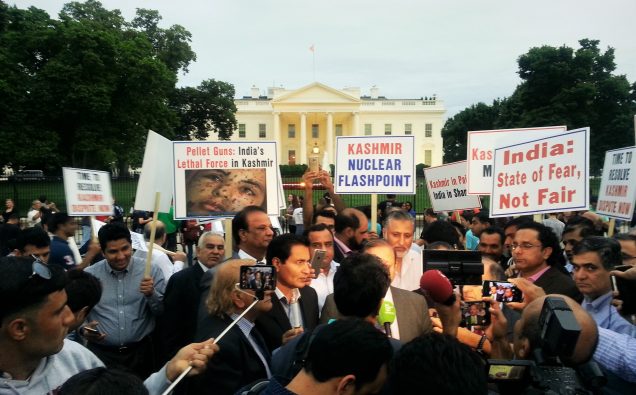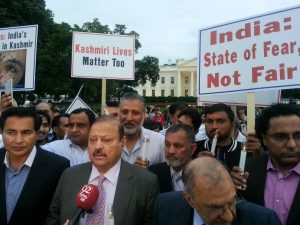
Hundreds of Kashmirs turned up for a candlelight vigil outside the White House Sunday evening, condemning human rights violations in Indian-controlled territory and demanding a U.S. role toward resolution of the longstanding conflict.
Barrister Sultan Mahmood, former prime minister of Azad Jammu and Kashmir, the part of the disputed territory under Pakistani control, led the peaceful demonstration by men, women and activists.
The participants held placards, saying the people of Kashmir under Indian control want freedom from New Delhi, and that “Kashmiri Lives Matter Too.”
“The international community cannot be a spectator. India is using brutal tactics to suppress the indigenous uprising for freedom. We are here to express solidarity with the victims of Indian repression in Kashmir,”Mahmood said.
The world must act right now to save the entire region from dangers of Pakistan-India conflict over the dispute, Mahmood said in comments to the media.
The Kashmir valley has seen massive demonstrations since last summer as people have come out on the streets to reject New Delhi’s use of force in response to their demands for freedom. According to media reports, Indian forces have been using harsh tactics like pellet guns to quell protests and stifle political dissent. In a detailed account of how young Kashmiri demonstrators lose eyesight in the face of Indian repressive tactics, The New York Times recently wondered if the unbridled use of pellet guns against protesters marked the largest mass blinding campaign in history.
India has also banned social media platforms as hundreds of pictures showing Indian forces’ brutality went viral – a move the UN human rights bodies and Reporters Without Borders have condemned as “collective punishment,” and violation of basic freedoms.
Meanwhile, India has blamed Pakistan for being behind the movement, and tried to equate the Kashmiris’ movement with post-9/11 militancy and terrorism. But Kashmiri leaders and many in the Indian intelligentsia have rebuked ultranationalist Prime Minister Nardendra Modi’ refusal to engage the Kashmiri leaders, many of whom remain imprisoned. Islamabad has rejected the Indian allegation, saying it does not back militancy in the region but supports Kashmiris’ struggle politically and diplomatically.
Pakistan has raised the issue at international forums including the United Nations and also sought world capitals’ intervention to stop bloodshed in the Indian held territory since New Delhi has shut the door on bilateral dialogue.
The two nuclear-armed neighbors have exchanged heavy fire along the Line of Control and South Asian watchers fear that tensions could escalate into yet another conflict, a scenario which would deal a blow to U.S. efforts to defeat terrorism in Afghanistan and the region.
In recent years, Washington has been encouraging the two sides to hold a dialogue on Kashmir. The Trump Administration has not yet articulated its policy toward South Asia but it has completed a review of the U.S. policy on Afghanistan – a battlefield for Pakistani and Indian competition. Vice President Mike Pence had indicated after 2016 election victory that the then President-elect Donald Trump’s deal-making skills could help resolve the long-festering dispute between Pakistan and India.
The United Nations has said it is willing to mediate on decades-old Kashmir dispute provided both Islamabad and New Dehli agree to its role.
At Sunday’s rally in Washington, Kashmiri-Americans belonging to both sides of Kashmir took part in the vigil as they marched in Lafayette Park to register their protest over India’s use of pellet guns against civilian demonstrators in the Indian controlled Kashmir.
“The Kashmir dispute can no longer be ignored. There are UN Security Council resolutions on it, which remain valid” Kashmiri-American scholar Ghulam Nabi Fai told protesters.
Zarif Khan, another activist, said the right to self-determination pledged to Kashmiris by the United Nations is the only way to resolve the dispute and end the sufferings of the people of Indian occupied Jammu and Kashmir.


















